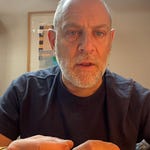Playback speed
×
Share post
Share post at current time
Share from 0:00
0:00
/
0:00
Transcript
On This Day: Poetry from Pain to Help our Healing
Weekly Video Recap of Below the Bible Belt
Jan 17, 2025
When life becomes too painful, as sorrow and stress overwhelm, and when words seem futile - can poetry help? Can the poetic echo the story of the soul in all its hues and help imagine healing?
Alfred Tennyson, who knew something about poetry, called the Book of Job
“the greatest poem of ancient and modern times.”
And so today, as we mark halfway through the journey of Job below the bible belt, and as, with bated breath, we follow the news and hope that a ceasefire between Israel and Hamas is truly finalized and activated, and with so much troubling news from all over the world, I read the words of Job who rages at injustice and I hear his poetry meeting the pain of right now. And I’m hearing other poems that help hold this moment and ease my own anxieties -
One of those poems has been playing in my head these past tense days - it’s a poem called "On This Day" ביום זה written in 1958 by Lea Goldberg, beloved Israeli poet who died on January 16 in 1970. Something in this poem manages to contain the simple complexities of life and death, a single day where grief overlap and overwhelm our senses:
“On this day, they break bread
and gather the fruit into baskets
On this day the sons return home
and the daughters await them in the doorways
On this day the clouds parade in the heavens
to bring the blessing of rain to fields and gardens
And in the city, in the alleyways of market places,
there rise up the fragrance of butter and oil,
there sparkle the scales of the fishes,
the wine brims.
How can you die, my soul, on this day?
This day that is so lovely and full
That is so simple and overflowing
That is light
That is day
That is a day like all days.
How can you go down to rest before the day’s tumult abates
How can you bid the day farewell before the clamour grows quiet.
How can you walk mourning
Before the day’s merriment is crushed?
How can you enter your eternal night
before you have kissed the first star?”
Goldbergs words meet those of Job - who in his rage and grief longs to be remembered, for his suffering to have some meaning beyond his bitter existence.
מִי־יִתֵּן אֵפוֹ וְיִכָּתְבוּן מִלָּי מִי־יִתֵּן בַּסֵּפֶר וְיֻחָקוּ׃ בְּעֵט־בַּרְזֶל וְעֹפָרֶת לָעַד בַּצּוּר יֵחָצְבוּן׃
Oh that my words were now written! oh that they were inscribed in a book!
that with an iron pen and lead they were engraved in the rock for ever!
Job 19:23-24
Whoever wrote Job did just that. The haunting questions and quest for meaning is what generations of readers and seekers of solace keep coming to, just as so many find faith in the poems of contemporary poets like Goldberg.
So today, before the sun sets and Sabbath Queen arrives, starting a weekend honoring the great political poet Rev. King, a weekend fraught with hopes and doubts and the uncertain, a presidential inauguration and a new age in the United States with many unknown and concerns -- let poems bring forth the blessing of the ages, words to live by, on this day, a day like all days, may there be good news and hands to hold us through the threshold.
Thank you for joining me below the bible belt. May there be good news -- and good days.
Shabbat Shalom
Recent Posts












Share this post